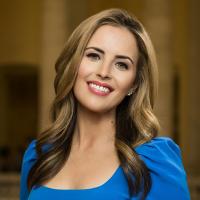Harris Gives First Interview Since Becoming Democratic Nominee: 'My Values Have Not Changed'
More than a month after President Joe Biden withdrew from the presidential race, Vice President Kamala Harris gave her first sit-down interview. It was a joint interview with her running mate, Minnesota Governor Tim Walz. The overarching issue: Harris' changing positions on multiple issues from the time she first ran for the White House in 2019 to now.
Harris tried to diffuse charges of flip-flopping by saying her values remain the same.
"I think the most important and most significant aspect of my policy perspective and decisions is my values have not changed," she told CNN.
On illegal immigration, she says she no longer thinks the border should be decriminalized.
CNN's Dana Bash asked her, "During the Biden-Harris administration, there were record numbers of illegal border crossings. Why did the Biden-Harris administration wait 3.5 years to implement sweeping asylum restrictions?"
Harris responded, "Well, first of all, the root causes work that I did as vice president, that I was asked to do by the president, has actually resulted in a number of benefits including historic investments by American businesses in that region. The number of immigrants coming from that region has actually reduced since we began that work."
Harris also defended "Bidenomics" despite record-high inflation in the last three years, claiming successes on issues like bringing down prescription medication costs and improving supply chains.
On the issue of fracking, which is critical to voters in the key swing state of Pennsylvania, she says she no longer supports banning it.
Bash: "Do you still want to ban fracking?"
Vice President Harris: "No, and I made that clear on the debate stage in 2020, that I would not ban fracking. As vice president, I did not ban fracking and as president, I will not ban fracking."
However, a CNN fact check showed Harris never stated her own position on fracking in that 2020 debate. She simply said that Biden wouldn't ban it.
On foreign policy, Harris again said she supports Israel, saying they "have to get a deal done" to end the war in Gaza, while also supporting a Palestinian state.
"I remain committed, since I've been on October 8th, to what we must do to work toward a two-state solution where Israel is secure and in equal measure the Palestinians have security and self-determination and dignity," Harris said.
Ari Fleischer, a former George W. Bush White House Press Secretary, responded online with this post on X: "How can Kamala say her position on Israel won't change when she's changed her position on virtually every stand she's already taken. I will never trust her to stand by Israel. She'll collapse under left-wing pressure in a heartbeat."
Meanwhile, on the stump in Michigan, former President Trump made headlines of his own. On the issue of abortion, Trump said he thinks a six-week ban is too short and vowed that his administration would ensure IVF treatments are more easily accessible.
"Under the Trump administration, your government will pay for or your insurance company will be mandated to pay for all costs associated with IVF treatment fertilization for women, IVF treatment. Because we want more babies, to put it very nicely," said Trump.
There are just over two months left until Election Day and in 11 days Harris and Trump will square off in their first debate.
NOTE: CBN neither supports nor opposes any political party or candidate. Our goal is to cover the news because truth matters. Please join with us in prayer for God to use CBN News to share the truth from a Christian perspective. God bless you!




